|
Chapter 28: Short-Lived Yefimiy has the distinction of being the first Slovensky not to hold the office of tysyatsky, mostly because, unlike his exiled brother Dobrynia, Yefimiy was never particularly good at playing politics; he's an honest man, quick to anger, which is not a particularly valuable set of traits for the treacherous web of alliances that makes up the current veche. But what he lacks in the field of politics, he more than makes up when it comes to running the family merchant business.  Tysyatsky Volodar, recognizing that Yefimiy could be a potential threat, offers him a more prominent role in the veche as his steward, hoping to garner some good will with Yefimiy and the Slovenskys.  Yefimiy, having not expected to actually become the patriarch of the Slovensky family, hasn't actually gone about having any children to secure the future of his dynasty and this has lead to some rumors within his family that he doesn't have an actual interest in women; Yefimiy sets about trying to please his family, and makes a determined effort to have an heir.  Yefimiy also asks the gods to bless him and his family in matters of business, as well as to bless the lands that he still holds. Perhaps to further quash the rumors about his sexuality, he offers up an eye to the gods, hoping to prove his bravery and zeal. 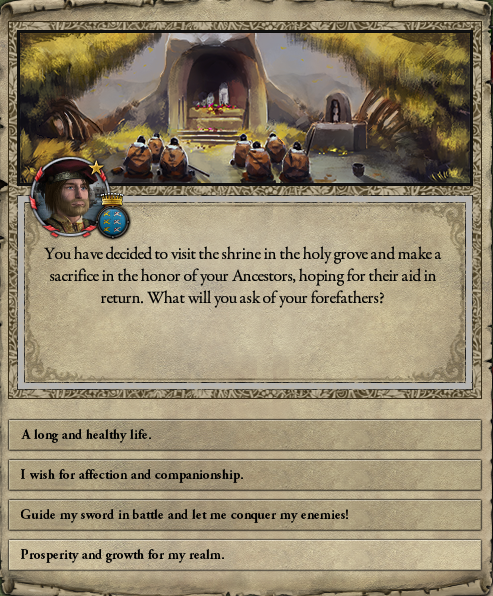  At the instance of his family, Yefimiy also invites Dobrynia back to Ilmenia, offering to become his older brother's patron. Dobrynia accepts his younger brother's invitation and, in September of 947, his exile ends. Also at the instance of his family, Yefimiy proclaims Dobrynia his heir until such a time that he has a child of his own.  With the return of Dobrynia, things begin to look up for the Slovenskys, as Dobrynia takes the reigns of the trading business once again; using Yefimiy's position as the realm's steward, Dobrynia is able to start building up the city of Torzhok, where the Slovenskys and their trading empire are now based out of.  With Dobrynia now instructing him, Yefimiy starts playing politics; leveraging his position as the primary tax collector of the realm, he has an incredible amount of say in the creation of new taxes and, when Volodar starts talking about increasing taxes on the chiefs, Yefimiy finds himself in the center of it all. With Dobrynia giving him advice the entire time, Yefimiy eventually sides with the chiefs who wish to see the tax fail; in one fell swoop, Yefimiy now has the friendship of the chiefs and high chiefs that control most of Ilmenia outside of Novgorod.  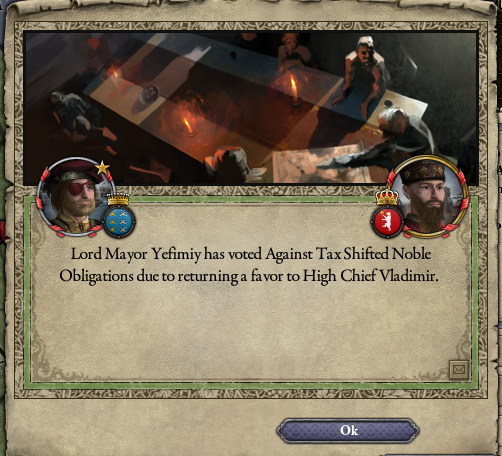 This would be Yefimiy's last action as the patriarch of the Slovensky family, as he dies of pneumonia in December of 947, having only lead his family for about four months. His brother Dobrynia is quickly proclaimed the family's new patriarch.  History remembers Yefimiy as Yefimiy Nedolgovechnyy, often translated as Yefimiy the Short-Lived.
|
|
|
|

|
| # ? Apr 27, 2024 22:12 |
|
Chapter 29: A Bad Start Dobrynia easily assumes control of the family business, mostly because he was effectively running it and using his brother Yefimiy as the public face. Dobrynia is just as capable as his late brother, but he also brings with him several connections in the veche, which more than make up for his shyness and quiet nature.  Tysyatsky Volodar also immediately makes Dobrynia his steward, again hoping to stop anyone looking to install him as the tysyatsky.  Dobrynia also continues his family's tradition of devoting themselves to Jarilo, hoping that the great god will bless both his business and lands with peace and prosperity; just like his brother before him, Dobrynia also sacrifices an eye to gain the god's blessings.   Dobrynia's first action as the patriarch of his family is to continue to consolidate their control over Novgorod's docks and trade by expanding the family's offices and shops in the city.  With the death of Yefimiy, the alliance of chiefs he was leading falls apart, as Dobrynia is too focused on securing his power to bother to take Yefimiy's place. This turns out to be a poor choice, as Volodar seizes the opportunity and has his allies in the veche pass a new set of standard taxes that targets the chiefs of Ilmenia, much to their displeasure.  Despite no longer having access to the craftsmen of Novgorod or the priests of the Khram Yarilo, Dobrynia continues to push for innovation and invention, in part hoping that Torzhok will eventually rival Novgorod in greatness; with Dobrynia as their patron, Torzhok slowly becomes a major center of learning, though it still doesn't hold a candle to the glory that is Novgorod.  Dobrynia continues to quietly run his family's business, collect taxes for the realm, and generally plot to increase his standing in the veche, when, in April of 948, a messenger from Novgorod arrives in Torzhok with startling news: Ilmenia is at war with the nomads of the steppe, as well facing a rebellion by the chief of Ingryia, who is extremely unhappy with Volodar's new taxes. Dobrynia can't do much about the nomads, but he can do something about the rebels and, in the process, earn himself some good will with the veche and the tysyatsky. He gathers his personal army and heads to Ingryia, where he defeats the small rebel army, ending the short lived rebellion. Volodar is so impressed that with Dobrynia's skills against the rebels that he offers him a position as a commander of one of Ilmenia's armies; Dobrynia accepts, seeing it as a chance to further increase his prestige and standing with the veche.   Before heading out to fight the nomads, Dobrynia stops at Torzhok to commission a new set of coins depicting him to celebrate his victory and promotion. Always looking to better his family's holdings, he chooses to debase the coins with lesser metals, allowing for a greater number to be minted. He immediately uses this excess gold to build a military warehouse to outfit his family's personal druzhina with weapons and armor.   On his stop over at Torzhok, Dobrynia also receives a message from the Voiny Yarilo, suggesting that he offer tribute to Jarilo for the many blessings he's received as of late; Dobrynia agrees and sets about making his sacrifice. The ceremony goes off with out a hitch and Dobrynia is confident that Jarilo smiles upon him.  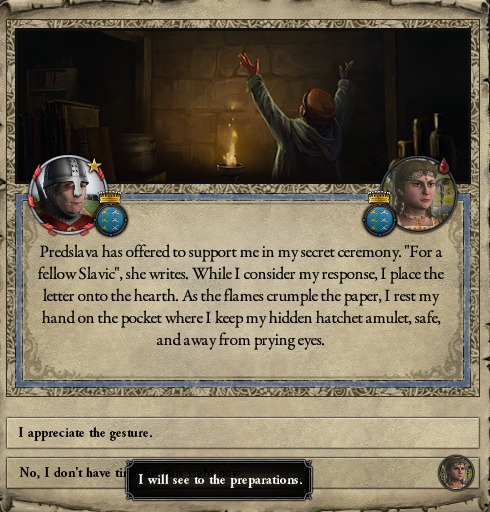 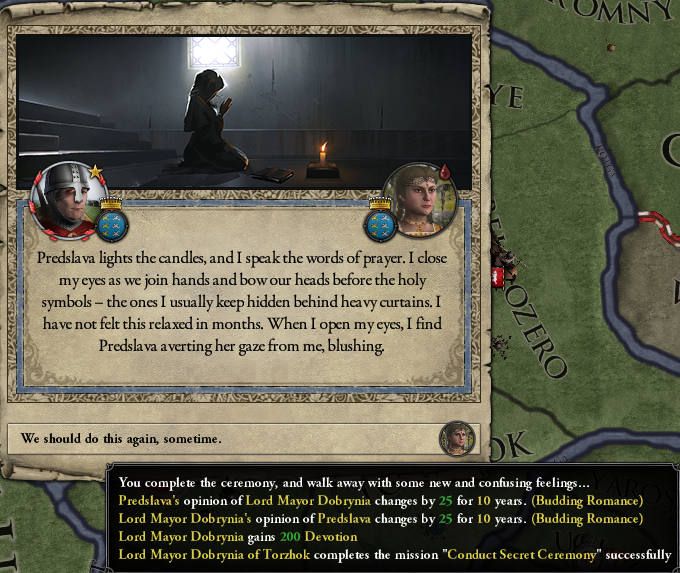 Of course, things go bad almost immediately; Dobrynia's sister, the wife of the Polish king, is capture by a rebel chief and forced to become his concubine, clearly in an attempt to gain a claim on Ilmenian lands. This terrible news is immediately followed up by news that Volodar has cracked down on anyone who dares to question the Perunian Church, and that, in the ensuing witch hunt, one of the members of the Voiny Yarilo has been caught and executed. Perhaps, then, it isn't surprising that, as 949 become 950 and Dobrynia finally arrives at the front, he has become a deeply depressed man. His only hope is that 950 will be a better year.  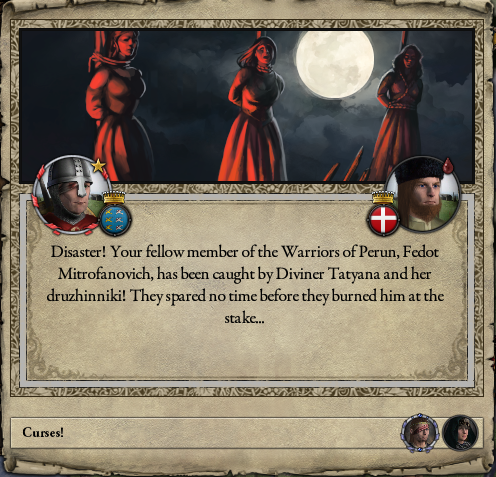 
|
|
|
|
State of the World: 950 Ilmenia has continued to grow and prosper and, with the adoption of the republic and conquest of Finland, it seems like this trend will continue for the foreseeable future; Ilmenia is now the undisputed ruler of the north and is second only to Poland, at least in terms of military strength. But where Ilmenia lacks in force of arms, it easily makes up for in wealth, as its situation allows it easy access to both the Baltic Sea and the Byzantine Empire, allowing for trade a fair part of the known world. With careful management and expansion, perhaps the next century will belong to Ilmenia.  To the west, the Western Roman Empire continues to be ruled by the Daufingi dynasty, despite the best efforts of its vassal kings; with the death of Emperor Unichis I at the Battle of Köln and the ascension of his young son Unichis II to the throne, an uneasy peace was reached between the Catholic kings of Germania, Saxony, Occitania, and Burgundy and the Norse Waryengians: the Catholics of the empire would be free to practice their religion and the Waryengians would be allowed to control the throne and, nominally, the empire. Its a peace that has made no one happy and has been further complicated by the fact that Unichis II stands to inherit the Eastern Roman Empire.  To the east, the Byzantine Empire, true heirs of Rome, is wracked by civil war once again, though this time its in an effort to save the empire from being inherited by Emperor Unichis II; Empress Xene I, the youngest of the last emperor's children, was captured years ago by the future emperor Unichis I and forced into becoming his concubine, which resulted in the birth of the couple's only child, Unichis II. While it was a travesty that the daughter of an emperor would be forced to be the concubine of a lowly Norse raider, no one actually thought that Xene would inherit the throne one day, after all she had four older sisters, who were all in good health. Of course, no one could've foreseen a disease striking Constantinople and killing most of the imperial family. What's more, no one could've foreseen Emperor Unichis I personally escorting Xene back to Constantinople to take up the crown and forcing the patriarch to legitimize their "marriage." And, well, they couldn't have foreseen Xene I falling into a comma not long after the death of her "husband" and basically ensuring that Unichis II, the only son of the two imperial dynasties, would be set to unite the two halves of the Roman Empire. And so, now, the Byzantine Empire fights to save the souls of its people, hoping against all odds that Xene I lives another day and that, with that extra day, the rebels manage to crown their chosen candidate emperor.  While the two heirs of the Roman Empire struggle to keep the light of Christianity alive, central Europe faces its own struggles. Poland has reasserted its dominance over the Wends and Bohemians once again and looks set to unite the three realms under one crown once again; perhaps this time it'll even stay united. Meanwhile, the Avars of Pannonia have chased out the Slavic tribes and established their kingdom once again, with the help of a rather unlikely ally: the Catholic Teutonic Order, which, with aide from the Lombards and the Franks, has established itself in Croatia and Serbia, the last hold outs of the old Pannonian Slavic kings. As of now, the Avars and the Teutons have an uneasy peace, as both look at the growing power of Poland and the increasing instability of the two haves of the Roman Empire with worry.  In Scandinavia, Norway continues to dominate the scene, though Denmark promises to give the Norwegians a run for their money, sooner or later. Sweden, as always, looks on with envy, having been forced by Ilmenia to give up most of their Finnish holdings, and any chance of expanding, long ago.  In Alban, the Welsh kings have continued to expand and have the Anglo-Saxon kings on the run; their expansion has further been aided by the throne of the Picts being inherited by one of their own dynasty, creating a formidable Albani alliance intent on taking the island back for themselves. Ireland continues to mostly ignore the squabbles of the Albani and the Anglo-Saxons, though this may be to their detriment, as the Welsh have slowly started to expand into the island.  In Hispania, the Muslims are back on the defensive, as the king of Occitania has made it his personal mission to bring Christianity to the peninsula, whatever the cost and he's had some minor success, mostly thanks to the other Frankish vassal-kings, who have offered him money and troops; they, like the king of Occitania, are eager to spread Christianity to Hispania and use it to supply troops and gold for the war to take back the Western Roman Empire from the heathen Waryengians. The kingdom of Asturias continues to limp along, effectively a puppet of the much more powerful Occitanian king and its only a matter of time before the small kingdom is annexed by Occitania outright.  North Africa has become quite tense, as the Catholic Kingdom of Africa, ruled by Lombards turned Berber, now finds itself surrounded by enemies; to the west, the Djazairid Sultanate and to the east, the Egyptian Musaid Sultanate. For now, the Djazarids are too distracted by the Catholics to the north and the Kingdom of Mali to the south, which has set its sights on Morocco as well. Meanwhile, the Musaid Sultanate has been too busy conquering Lombardy's African holdings, but its only a matter of time before they set their eyes on the Kingdom of Africa.  In Italy, the Kingdom of Lombardy is once again in a civil war; the rebel dukes of the north, seeing the weakness of the Frankish empire, wish to throw off their shackles and be free of Frankish interference. Unfortunately, the current dynasty, long propped up by the Franks, sees things differently and have called for aide from the Western Roman Emperor; now Waryengians are marching around the Italian peninsula and things aren't looking particularly good for the northern rebels. 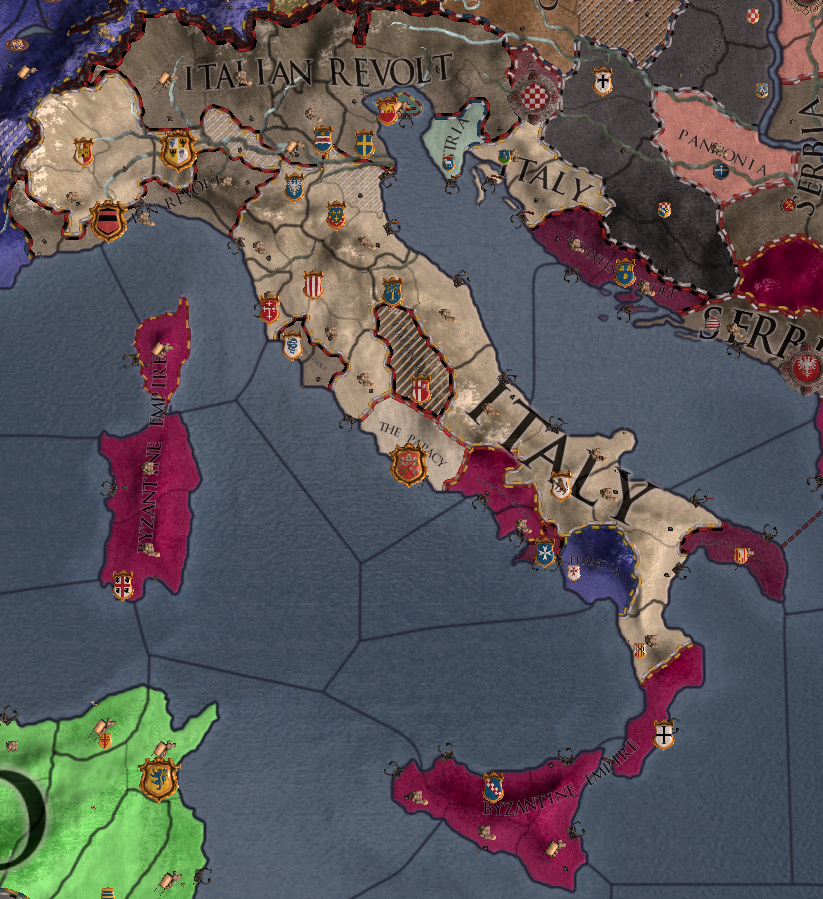 The only notable difference in the Middle East is that Egypt has been forced to end its conquest of Ethiopia early; the Ethiopian kings have, wisely, seen the light of the Prophet Mohammad and have adopted Islam. This has turned out to be an incredibly good decision, as the sultans of Yemen embraced the Shia branch of Islam and, in the resulting series of wars, Ethiopia claimed most of their lands.  Finally, the eastern steppes continue to be a mess of Tengri nomads, though the Khazars have greatly fallen and are slowly being replaced by the likes of the Ghuzz and Jashnakirids. Ashina, Ilmenia's sometimes ally, also survives, and look ready to become the region's primary power.  Religous Map  Political Map 
|
|
|
|
It's gonna be rather difficult to become third Rome once the other ones reunite
|
|
|
|
Germanic Pagan united Rome is never going to happen but wouldn't it be glorious if it did.
|
|
|





